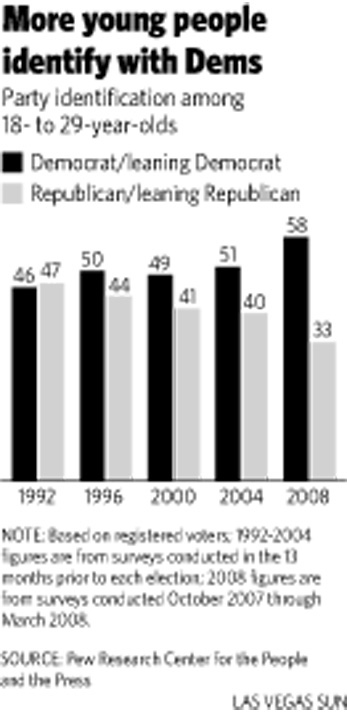Sunday, July 20, 2008 | 2 a.m.
Rep. Dean Heller, the Republican representing Nevada’s Second Congressional District, caused a Beltway kerfuffle last week when he said the Republican class of 1994, the revolutionaries swept into power with Newt Gingrich, had betrayed their principles.
They went native. They came to drain the swamp, and they wound up drinking from it instead.
Conservatives like Heller, as well as Nevada conservative operative Chuck Muth, point to the growth in federal spending to say President Bush and his enablers in Congress have abandoned the great small-government heritage of Barry Goldwater and Ronald Reagan.
To some degree, it’s true. In inflation-adjusted dollars, Bush is the biggest spender since Lyndon Johnson, with average discretionary spending, which includes defense and domestic programs but not Medicare or Social Security, increasing 5.3 percent per year, according to the Cato Institute. Defense and war drove much of this, totaling an 86 percent increase since 2001.
(For some perspective, however, note that federal outlays as a percentage of gross domestic product have barely moved since the late 1960s. Also, on the dreaded “earmarks,” the special spending items members of Congress send back home: They make up a tiny fraction of federal spending.)
Still, here’s the view of establishment conservatives, voiced by National Review’s Mark Hemingway: “The conservative leadership stopped being conservative.”
This drives conservatives into paroxysms of anger. They claim the spending profligacy, combined with the embarrassing Republican scandals of lobbyist Jack Abramoff and Reps. Bob Ney, Mark Foley, John Sweeney, Curt Weldon, et al., kept conservative voters at home in 2006, causing the big defeat.
If Republicans lose this election, conservatives will say again that their voter base punished Republicans for some impure behavior or other.
It’s always a comforting notion for a political movement, on the verge of popular rejection, to tell itself that if only we’d lived by the true principles, we’d be succeeding. Soviet Marxists made this argument repeatedly over decades, as did some 1980s era American liberals.
But it can also be highly dangerous if it’s nothing more than self-delusion, and a look at some polling data shows how that could very well be the case.
The problem with the conventional conservative analysis is that it seems to ignore the tremendous demographic and political changes of the past decade or so.
To wit:
In 2007, there were 43.1 million Americans ages 18 to 29, and another 16 million ages 30 to 34. That’s 59 million Americans, or 20 percent of the population. There are more voters in their 20s than voters older than 65.
In 1994, when the Republicans came to Washington to cut taxes and spending and send America to church, almost none of these people was old enough to vote.
And, what are their political and social attitudes?
According to Pew Research Center data survey released in April, young voters prefer the Democrats by 25 points, a spread never seen before. More than 60 percent of these voters believe we should have government-run, single-payer health care, according to a New York Times poll. That’s “socialized medicine” to Chuck Muth.
A plurality of these voters favors gay marriage, and a strong majority favors either gay marriage or civil unions for same-sex couples.
Here’s the painful reality conservatives must confront: The new pool of young Democratic voters, who are quite liberal and about 35 million strong, has changed the makeup of the electorate.
In this context, the notion that cutting earmarks will save the party from disaster is like Custer ordering his men to get haircuts on the fateful day.
Victory for Democrats in this election is by no means a lock: Republicans wisely chose a candidate in Sen. John McCain with tremendous crossover appeal, while Democrats took an electoral risk with younger and first-ever black nominee Sen. Barack Obama.
And it’s possible over time young voters will become more conservative, but Heller and his pals better get to persuading, and fast: All the evidence shows that once voters support a party in two consecutive elections — and young people supported Democrats by a wide margin in 2004 and even more so in 2006 — they never look back.


Join the Discussion:
Check this out for a full explanation of our conversion to the LiveFyre commenting system and instructions on how to sign up for an account.
Full comments policy